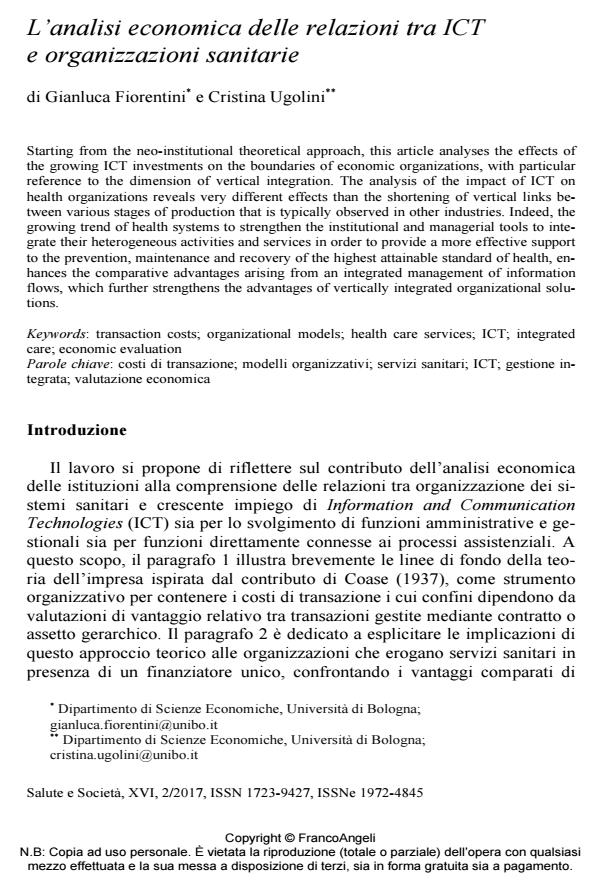L’analisi economica delle relazioni tra ICT e organizzazioni sanitarie
Titolo Rivista SALUTE E SOCIETÀ
Autori/Curatori Gianluca Fiorentini, Cristina Ugolini
Anno di pubblicazione 2017 Fascicolo 2017/2 Lingua Italiano
Numero pagine 23 P. 42-64 Dimensione file 133 KB
DOI 10.3280/SES2017-002004
Il DOI è il codice a barre della proprietà intellettuale: per saperne di più
clicca qui
Qui sotto puoi vedere in anteprima la prima pagina di questo articolo.
Se questo articolo ti interessa, lo puoi acquistare (e scaricare in formato pdf) seguendo le facili indicazioni per acquistare il download credit. Acquista Download Credits per scaricare questo Articolo in formato PDF

FrancoAngeli è membro della Publishers International Linking Association, Inc (PILA)associazione indipendente e non profit per facilitare (attraverso i servizi tecnologici implementati da CrossRef.org) l’accesso degli studiosi ai contenuti digitali nelle pubblicazioni professionali e scientifiche
;
Keywords:Costi di transazione; modelli organizzativi; servizi sanitari; ICT; gestione integrata; valutazione economica
- Hart O., Moore J. (1990). Property rights and the nature of the firm. Journal of Political Economy, 98: 1120-57. DOI: 10.1086/26172
- Buntin M.B., Burke M.F., Hoaglin M.C. and Blumenthal D. (2011). The benefits of Health Information Technology: a review of the recent literature shows predominantly positive results. Health Affairs, 30 (3): 464-71.
- Blois K.J. (1972). Vertical Quasi-Integration. Journal of Industrial Economics, 20: 253-72. DOI: 10.2307/209805
- Bresnahan T.F. and Trajtenberg M. (1995). General purpose technologies ‘Engines of growth’?. Journal of econometrics, 65(1): 83-108.
- Buccoliero L., Calciolari S. and Marsilio M. (2008). A methodological and operative framework for the evaluation of an e‐health project. The International journal of health planning and management, 23(1): 3-20.
- Chaudhry B., Wang J., Wu S., Maglione M., Mojica W., Roth E. et al. (2006). Systematic review: impact of health information technology on quality, efficiency, and costs of medical care. Annals of Internal Medicine, 144 (10):742–52. DOI: 10.7326/0003-4819-144-10-200605160-0012
- Coase R. (1937). The Nature of the Firm, Economica, 4; trad. it. La natura dell’impresa, in Impresa, mercato e diritto, Bologna, Il Mulino, 1995, 73-96.
- Danzon P.M., Furukawa M. (2010). E-Health: effects of the Internet on competition and productivity in health care. In: Litan R.E. and Rivlin A.M., eds., The economic payoff from the internet revolution. Brookings Institution Press.
- Davis F.D. (1989). Perceived Usefulness, Perceived Ease of Use, and User Acceptance of Information Technology. MIS Quarterly, 13(3): 319-340. DOI: 10.2307/24900
- Dietrich M. (1994). The Economics of Quasi-Integration. Review of Political Economy, 6(1): 1-18. DOI: 10.1080/0953825940000000
- Draka M., Sadun R., Van Reenen J. (2006). Productivity and ICT: A Review of the Evidence. CEP Discussion Paper No 749.
- Enthoven A. (1988). Theory and practice of managed competition in health care finance. Amsterdam: North Holland.
- France G. (1998). Healthcare quasi markets in a decentralised system of government. In: Bartlett W., Roberts L.A., Le Grand J., eds., Quasi-market reforms in the 1980s: a revolution in social policy. Bristol: The Policy Press.
- Goldzweig C.L., Towfigh A., Maglione M., Shekelle P.G. (2009). Costs and benefits of health information technology: new trends from the literature. Health Affairs, 28(2): w282–93.
- Grossman S., Hart O. (1986). The Costs and Benefits of Ownership: a Theory of Lateral and Vertical Integration. Journal of Political Economy, 94: 691-719. DOI: 10.1086/26140
- Light D.W. (2001). Comparative institutional response to economic policy managed competition and governmentality. Social Science & Medicine, 52: 1151-66. DOI: 10.1016/S0277-9536(00)00236-
- Le Grand J. (2002). Further tales from the British National Health Service, Health Affairs, 21(3): 116-129.
- Louis D.Z., Robeson M., McAna J. et al. (2014). Predicting risk of hospitalisation or death: a retrospective population-based analysis. BMJ Open, 4: e005223.
- Malone T., Yates J., Benjamin R. (1987). Electronic Markets and Electronic Hierarchies. Communications of the ACM, 30: 484-497. DOI: 10.1145/214762.21476
- Odlyzko A. (2012). The volume and value of information. International Journal of Communication, 6: 920-935.
- Solow R. (1987). We’d better watch out, New York Times Book Review, July 12, page 36.
- Telecom Italia (2015) Italia connessa. --Testo disponibile al link: http://italiaconnessa.telecomitalia.com/sites/default/files/ItaliaConnessa2015.pdf
- Ugolini C. (2004). Verso una rilettura del modello di concorrenza amministrata?. Rivista delle politiche sociali, 4: 197-212.
- Williamson O. (1975). Market and Hierarchies: Analysis and Antitrust Implication. New York: Free Press.
Gianluca Fiorentini, Cristina Ugolini, L’analisi economica delle relazioni tra ICT e organizzazioni sanitarie in "SALUTE E SOCIETÀ" 2/2017, pp 42-64, DOI: 10.3280/SES2017-002004